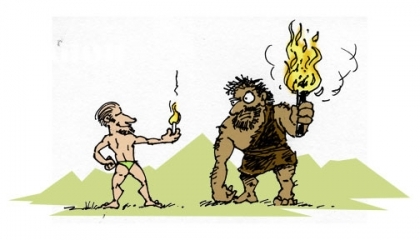by lcraig on August 1, 2008

Consulting for a retail chain, I recently had the opportunity to tour the store looking for products with ‘green’ attributes. Entering the appliance section, I was faced with a serious contradiction. Here, the message seemed clear that the MORE power the appliance uses, the better. “500 watts!” boasted one blender box. “600 watts!!” screamed another. Topping the list was the Krups Motor Technik with A THOUSAND WATTS of ice-pulverizing power!!! (Don’t bother with cubes, Honey, we can buy our ice in blocks now.) This theme continued with microwave ovens, fabric steamers, hair dryers, coffee grinders, and of course – power tools.
So how hard-wired is our need for “More Power, Scotty?” And what can replace that compulsion in an energy-hungry future?
In one article, from a 1972 issue of Time Magazine, Social Science Professor David Klein postulated that it goes way back. “The derring-do that had survival value in frontier days is still extolled in the U.S.; yet it is obsolete. In an industrialized nation where most jobs are routine, a man cannot win status through on-the-job valor. To compensate, he surrounds himself with power tools, outboard motors, high-performance cars. These give him, at play, the feelings of control, power, masculinity and risk no longer available at work.”
Categories: